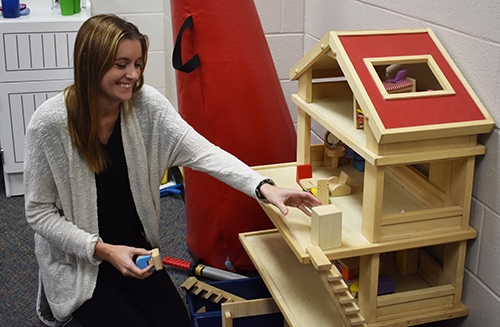
Elementary school students who received child-centered play therapy services over the course of a school year showed significant positive changes, according to data collected from a research study by two University of Arkansas professors.
Kristi Perryman, assistant professor of counselor education, directs the Office of Play Therapy Research and Training and is a Registered Play Therapist Supervisor. Graduate students in the counselor education program work as interns in local schools to gain practical experience and assist the schools to provide counseling services to children.
Perryman and Lisa Bowers, an assistant professor of communication disorders, received a grant from the provost's office to implement the program. Both professors are in the College of Education and Health Professions.
The International Journal of Play Therapy published the results of the study in an article titled "Turning the Focus to Behavioral, Emotional, and Social Well-Being: The Impact of Child-Centered Play Therapy."
The project at Turnbow used the treatment protocol established in the Primary Mental Health Project. One key is that it's a preventive approach, identifying children at risk for behavioral and emotional problems through a screening process, instead of waiting until children are exhibiting severely disruptive behaviors with failing grades and significant attendance issues.
The school's professional counselor worked with the faculty and graduate students to screen children in four types of behavior: task orientation, behavioral control, assertiveness and peer/social skills. The results of the study demonstrated significant improvement in all four areas assessed for the students who received services.
"Findings suggest that child centered play therapy is an effective preventative approach for students who are at-risk for developing adverse behaviors that could negatively impact their academic success," the authors said.
The Primary Mental Health Project was first used as a pilot study in 1957 in Rochester, New York, and is recognized as a national, evidence-based program. It helps children in pre-kindergarten through third grade adjust to school, gain confidence, improve social skills, and focus on learning. Child-centered play therapy is recognized as the most developmentally appropriate approach for working with elementary students because it does not rely on verbalization on the part of the child in order to heal.
The researchers collected data from their work with 36 students at the school, where 62 percent of students are identified as Hispanic or Pacific Islander and 82 percent receive free or reduced-price school lunch. Students receiving special education services other than speech-language therapy were not eligible to participate in the study.
"There is a collective desire for all children to grow up to be healthy, well-adjusted adults who positively contribute to society," the authors said. "Inherent to this societal goal is the need to focus on not only the academic success of students in the educational environment, but also their emotional and social well-being. … Additionally, a relatively small investment in terms of people, time, and money positively impacted these students' lives, making child-centered play therapy through the Primary Mental Health Project model a sound option for schools. We have the potential to change the trajectory of children's success in school by using models that rely on their natural language of play."
The project is now in its third year and the researchers are completing a journal article about the academic gains made by students who participated.
Topics
Contacts
Heidi S. Wells, director of communications
College of Education and Health Professions
479-575-3138, heidisw@uark.edu